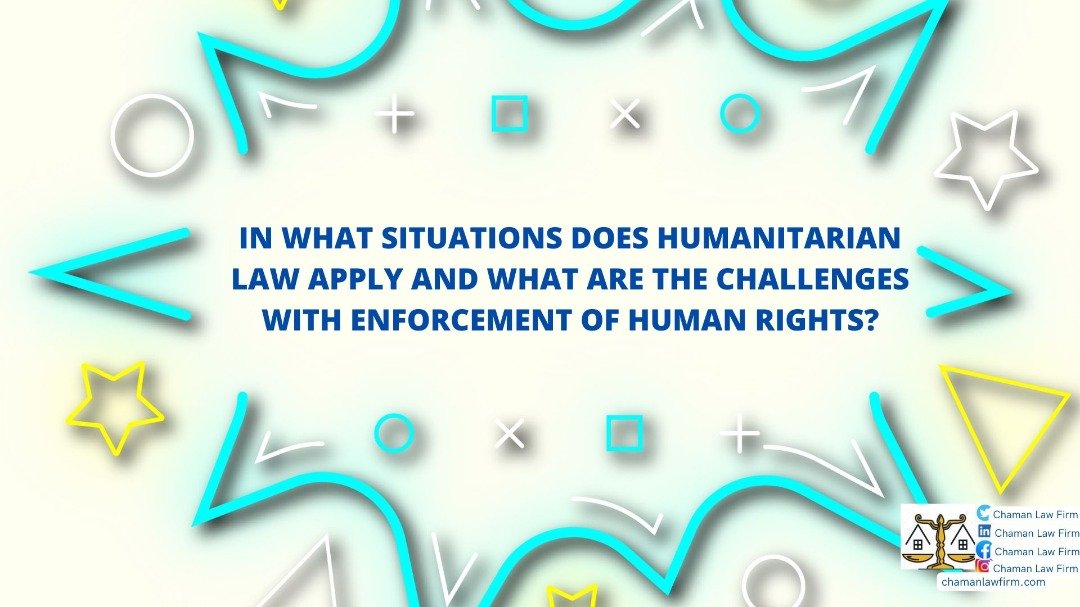OUR STORY
Quality, not quantity
We have made quality our habit. It’s not something that we just strive for – we live by this principle every day.

IN WHAT SITUATIONS DOES HUMANITARIAN LAW APPLY AND WHAT ARE THE CHALLENGES WITH ENFORCEMENT OF HUMAN RIGHTS?
Humanitarian Law also referred to as law of armed conflict (LOAC) or jus in bello. It covers the enactment of laws and instruments designed at mitigating human suffering in times of war and conflict. It is a branch of international law committed to providing protection to war victims. Humanitarian law applies explicitly in armed conflict to limit the conduct of warring parties, as well as to provide protection and humane treatment to those who are not or cannot participate in the hostilities.
Humanitarian law, like international human rights law, defends people’s lives and dignity by preventing torture and cruel treatment, providing rights for those facing criminal charges, prohibiting discrimination, and establishing safeguards for the protection of women and children. Humanitarian law also covers the conduct of wars, as well as combatants and prisoners of war.
CAUSES OF ARMED CONFLICT
There are several specific causes of armed conflicts, major contributors are:
1. Human Rights Violation 2. Racial or tribal clashes 3. Arms proliferation 4. Religion differences Bad governance
THREATS ARMED CONFLICTS POSES ON ENFORCEMENT OF HUMAN RIGHTS THREATS ARMED CONFLICTS POSES ON ENFORCEMENT OF HUMAN RIGHTS
During times of armed conflict, respect and regard for human rights diminishes. Basic rights becomes increasingly difficult to enforce. Conflicts are as a result of the struggle for fair access to resources and freedom from discrimination. Conflicts have devastating repercussions and the very things demanded are denied. Some of these consequences are:
1. Destruction of infrastructure
2. Endangered human life
3. Disabilities amongst victim of war
4. Displacement from homes and increase in refugee flow
5. Climate pollution
6. Forced migration Economic depression amongst others
These consequences cuts across the basic fundamental rights such as the rights to Life, dignity of human persons, freedom of movement and freedom from discrimination. Enforcement of these basic rights is meant to safeguard Life and property, but in times of conflicts, access to justice and security is limited and sometimes denied.
MECHANISMS TO ENFORCE HUMAN RIGHTS IN TIMES OF CONFLICTS.
In times of armed conflict, there are a variety of mechanisms that can be used. This includes humanitarian intervention, which is the use of force by another state or states against another state with the stated goal of eliminating or decreasing suffering in the first state. This is made possible by international agreements and treaties, such as Article 28 of the Universal Declaration of Human Rights, which affirms the right to a social and international order that respects human rights. The UN Security Council is empowered under Chapter VII powers to sanction action in the event of a threat to international peace and security.
Additionally, the international community, through the United Nations, is also responsible for using suitable diplomatic, humanitarian, and other nonviolent means, such as trade sanctions and intervention through the UN Peacekeeping Force.
Finally, the problem of sovereignty makes it difficult for other States or parties to intervene in armed confrontations. In such cases, organizations must be cautious not to use force, which could escalate conflicts, and instead rely on diplomatic measures and support for victims of armed conflict in terms of medical care, security, and ease for migrants and refugees.
NB: This article is not a legal advice, and under no circumstance should you take it as such. All information provided are for general purpose only. For information, please contact chamanlawfirm@gmail.com
WRITTEN BY CHAMAN LAW FIRM TEAM
EMAIL: chamanlawfirm@gmail.com
TEL: 08065553671, 08024230080

